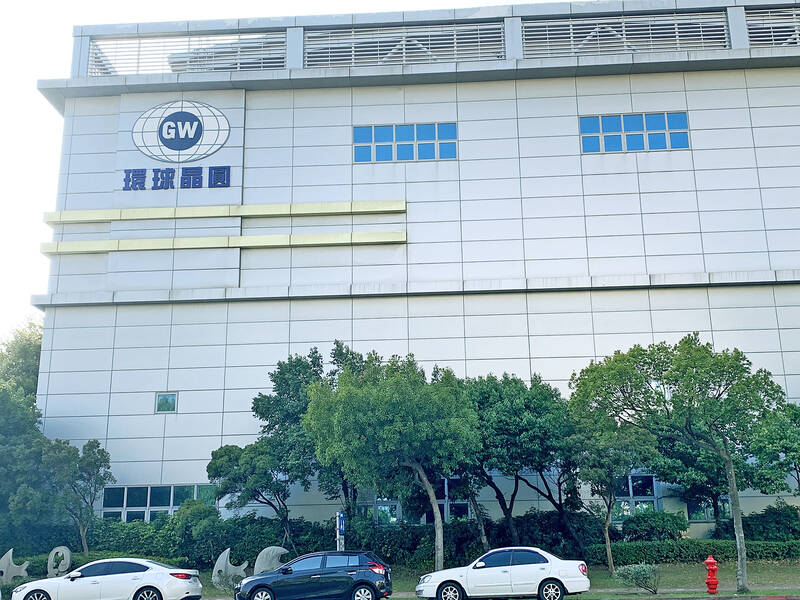GlobalWafers Co (環球晶圓) yesterday said shipments from most of its factories that suffered hacker attacks last week are expected to resume today.
GlobalWafers, the world’s third-largest silicon wafer maker, said in a statement that information systems operated by some of its factories suffered hacker attacks on Wednesday last week.
The company said its cybersecurity mechanism activated when the attacks were detected and it later also entrusted outside cybersecurity experts to boost its defenses and restore the targeted information systems.

Photo: Grace Hung, Taipei Times
A through investigation confirmed critical information was not accessed, GlobalWafers said.
To lower the risk, GlobalWafers said it partially shut down its operating systems during the initial phase of the attacks, impacting production and shipments at certain plants.
However, shipments were partly restored last week and most are expected to return to normal today, it said.
As the damage varied from factory to factory, insurance compensation is still being calculated, GlobalWafers said, adding that the company will continue to upgrade web communications and strengthen information safety infrastructure.
GlobalWafers did not disclose how many factories were attacked or the locations of the affected plants.
The company runs 18 sites in nine countries around the world including Taiwan, China, the US, Japan, Denmark, South Korea, Italy, Malaysia and Singapore.

Hon Hai Precision Industry Co (鴻海精密) yesterday said that its research institute has launched its first advanced artificial intelligence (AI) large language model (LLM) using traditional Chinese, with technology assistance from Nvidia Corp. Hon Hai, also known as Foxconn Technology Group (富士康科技集團), said the LLM, FoxBrain, is expected to improve its data analysis capabilities for smart manufacturing, and electric vehicle and smart city development. An LLM is a type of AI trained on vast amounts of text data and uses deep learning techniques, particularly neural networks, to process and generate language. They are essential for building and improving AI-powered servers. Nvidia provided assistance

GREAT SUCCESS: Republican Senator Todd Young expressed surprise at Trump’s comments and said he expects the administration to keep the program running US lawmakers who helped secure billions of dollars in subsidies for domestic semiconductor manufacturing rejected US President Donald Trump’s call to revoke the 2022 CHIPS and Science Act, signaling that any repeal effort in the US Congress would fall short. US Senate Minority Leader Chuck Schumer, who negotiated the law, on Wednesday said that Trump’s demand would fail, while a top Republican proponent, US Senator Todd Young, expressed surprise at the president’s comments and said he expects the administration to keep the program running. The CHIPS Act is “essential for America leading the world in tech, leading the world in AI [artificial

DOMESTIC SUPPLY: The probe comes as Donald Trump has called for the repeal of the US$52.7 billion CHIPS and Science Act, which the US Congress passed in 2022 The Office of the US Trade Representative is to hold a hearing tomorrow into older Chinese-made “legacy” semiconductors that could heap more US tariffs on chips from China that power everyday goods from cars to washing machines to telecoms equipment. The probe, which began during former US president Joe Biden’s tenure in December last year, aims to protect US and other semiconductor producers from China’s massive state-driven buildup of domestic chip supply. A 50 percent US tariff on Chinese semiconductors began on Jan. 1. Legacy chips use older manufacturing processes introduced more than a decade ago and are often far simpler than

Gasoline and diesel prices this week are to decrease NT$0.5 and NT$1 per liter respectively as international crude prices continued to fall last week, CPC Corp, Taiwan (CPC, 台灣中油) and Formosa Petrochemical Corp (台塑石化) said yesterday. Effective today, gasoline prices at CPC and Formosa stations are to decrease to NT$29.2, NT$30.7 and NT$32.7 per liter for 92, 95 and 98-octane unleaded gasoline respectively, while premium diesel is to cost NT$27.9 per liter at CPC stations and NT$27.7 at Formosa pumps, the companies said in separate statements. Global crude oil prices dropped last week after the eight OPEC+ members said they would